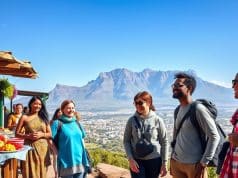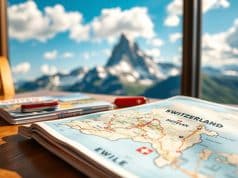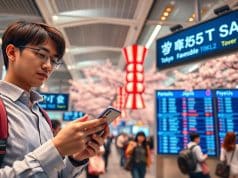Many Nigerians dream of working or studying in Australia. This guide is here to help you through the process.
It covers everything from getting a visa to planning your trip.
Anúncios
Each part of this guide is designed to make your journey easier. By following these steps, you’ll be ready for your new life in Australia.
For more information, see the official travel site:
You will be redirected to another website
Understand the Visa Process for Australia
Getting an Australian visa can seem hard, but knowing the types and what they need is key. If you’re looking to work or study abroad, it’s important to know your options. You’ll also need to understand the steps to apply for a visa.
Types of Australian Visas
Australia offers different visas for various reasons, like work or study. Here are some main types:
- Student Visa (subclass 500)
- Temporary Graduate Visa (subclass 485)
- Work Visa (various subclasses)
- Visitor Visa (subclass 600)
Eligibility Criteria for Work and Study Visas
Knowing what you need for work and study visas is crucial. Each visa has its own rules, like age limits and financial needs. Here are some common things you might need:
- Age restrictions, typically for students and skilled workers
- Proof of English language proficiency
- Evidence of financial capability to support living expenses
- Relevant qualifications for the intended course or occupation
How to Apply for a Visa
Applying for an Australian visa involves a few key steps. First, figure out which visa you need. Then, gather all the required documents, like ID and financial info. When you’re ready, fill out the forms and answer any extra questions from the Australian Department of Home Affairs. Being well-prepared can make the process easier.
Prepare Necessary Documentation
Gathering the right documents is key to a successful visa application for Australia. You’ll need to show your identity, financial status, and education. This guide will help you with the essential documents, like ID, accommodation proof, and visa application forms.
Essential Documents for Visa Application
Applicants must provide several documents for their visa application. These include:
- A valid passport with at least six months of validity remaining.
- Completed visa application form tailored to the type of visa being sought.
- Recent passport-sized photographs that meet official requirements.
- Proof of accommodation in Australia, such as hotel bookings or a letter from a host.
- Evidence of employment or studies during the stay.
Financial Documentation Requirements
Financial documents are vital to show you can support yourself in Australia. You should include:
- Recent bank statements that clearly show account transactions and balances.
- Proof of income, including pay slips or tax returns.
- Evidence of sponsorship if applicable, such as a letter from a family member or friend residing in Australia.
Academic Qualifications and Transcripts
For study visa applications, you must document your academic qualifications. You’ll need:
- Original or certified copies of academic transcripts from previous institutions.
- Certificates or diplomas confirming completion of relevant courses.
- English language proficiency test results, such as IELTS or TOEFL, if applicable.
Book Your Flight to Australia
Booking a flight to Australia means picking the right airline and finding great deals. There are many airlines to choose from. It’s important to think about comfort, cost, and how long the flight is. Planning ahead helps make the best choices.
Choosing the Right Airline
Choosing an airline is key. Look for airlines known for good service, comfort, and reputation. Qantas, Emirates, and Singapore Airlines are top choices. They’re known for great customer service and entertainment.
Reading online reviews can also help. They give a real look at what flying with an airline is like.
Tips for Finding Affordable Flights
Looking for cheap flights to Australia takes some effort. Use flight comparison websites to find the best prices. Here are some tips:
- Book flights during sales or off-peak seasons.
- Set price alerts on flight comparison sites to track fare changes.
- Be flexible with dates to find the lowest fares possible.
Best Times to Book Your Flight
When you book your flight matters a lot. Booking early can lead to cheaper flights. Try to buy tickets three to six months before you go.
Also, flying mid-week can save you money. It’s cheaper than flying on weekends.
| Airline | Price Range (USD) | Flight Duration (Hours) | Service Rating |
|---|---|---|---|
| Qantas | $800 – $1,500 | 20 – 24 | 4.6/5 |
| Emirates | $900 – $1,700 | 20 – 25 | 4.7/5 |
| Singapore Airlines | $850 – $1,600 | 20 – 26 | 4.8/5 |
Plan Your Arrival in Australia
Getting ready to arrive in Australia means knowing the key steps to make your transition smooth. When you land, you’ll go through passport control. Here, officials check your documents to make sure you’re who you say you are and that you have the right visa.
After that, you’ll face customs regulations. You’ll need to declare certain items like food, plants, and medicines. Knowing these steps can help you avoid any delays.
Arrival Procedures at the Airport
When you arrive in Australia, you’ll first meet immigration and customs. Make sure you have your passport and arrival card ready. The arrival card is important because it helps you declare any restricted items.
If you have something that doesn’t follow customs rules, you might face penalties. Understanding these procedures can make your entry into Australia much easier.
Transportation Options from the Airport
After you get through the terminal, you’ll find many ways to get to your destination. You can take a taxi for a direct ride but it might cost more. Or, you can choose a shuttle service for a shared ride at a lower price.
For those on a tight budget, public transport like buses and trains is a good option. It’s affordable and works well if you know the local routes. Your choice depends on your budget and what you prefer.
Accommodation Arrangements
Don’t forget to plan your accommodation in Australia before you arrive. Booking a place to stay ahead of time is wise. You can choose from hotels, hostels, short-term rentals, or shared housing.
Each option fits different budgets and needs. Picking the right place to stay can make your transition smoother and more comfortable.
Familiarize Yourself with Australian Culture
Getting used to Australian culture can make your visit or move much better. Knowing the customs and etiquette is key to making friends with locals. It makes interactions smoother and your stay more enjoyable.
Things like greetings and how to act at meals are important in social settings.
Understanding Australian Customs and Etiquette
Australians are known for being laid-back yet respectful. Saying “G’day” or smiling can make a good first impression. Wait for everyone to sit down before you start eating.
Tipping is nice but not required, usually for excellent service. It’s important to respect people’s space. Keeping a comfortable distance helps in talking.
Learning these customs helps you fit in better in daily life.
Key Language and Communication Tips
Good communication is crucial in Australian culture. English is the main language, but slang and colloquialisms are common. Knowing terms like “arvo” for afternoon or “bikkie” for biscuit is useful.
It shows you’re trying to fit in. Being friendly and open in your body language helps make friends. Talking in the local way can lead to fun chats and memorable experiences.
Set Up Your Finances in Australia
Setting up your finances in Australia is key for newcomers. It makes living abroad better and easier. You’ll need to open a bank account, understand currency exchange, and budget for living costs.
Opening a Bank Account in Australia
To open a bank account in Australia, you’ll need ID and proof of address. Banks like Commonwealth Bank, Westpac, and ANZ have accounts for international customers. It’s smart to compare fees, online access, and services.
Many banks let you open an account before you arrive. This makes starting your life in Australia easier.
Currency Exchange and Payment Methods
Knowing about currency exchange in Australia is important. Avoiding high fees at airports is wise. Use local banks or trusted exchange services for better rates.
Also, using cashless payments like credit cards and mobile payments is safer and easier.
Budgeting for Living Expenses
Budgeting for travel is more than just the initial costs. You’ll need to think about ongoing expenses like housing, food, transport, and fun. Living costs in big cities can be different.
Creating a budget helps keep your finances healthy and reduces stress. Set aside money for different things and check your spending often. This way, you can enjoy your new life in Australia.
Get Health Insurance Coverage
Getting health insurance is key for anyone going to Australia. It helps avoid big medical bills. There are many Australian health insurance plans to choose from. This ensures travelers get the right coverage for their trip.
Choosing the right health insurance wisely can give peace of mind while abroad.
Importance of Health Insurance for Travelers
Travelers should get health insurance because medical care in Australia is expensive. A sudden illness or injury can cost a lot without insurance. Health insurance covers hospital visits and treatments.
It also gives access to needed medical services. This is crucial for travelers, ensuring they get the care they need.
Types of Health Insurance Plans Available
There are many Australian health insurance plans for international travelers. The main types are:
- Private Health Insurance: Offers a wide range of services and quicker access to specialists.
- Public Health Insurance: Gives access to the public healthcare system, but may have longer waiting times for some treatments.
Choosing the right plan depends on personal health needs, how long you’ll stay, and what coverage you want.
How to Obtain Health Insurance in Australia
To get health insurance in Australia, follow these steps:
- Research and compare different health insurance plans.
- Check if you’re eligible and what coverage you need based on your situation.
- Reach out to insurance providers to ask questions and get more information.
- Apply for the plan and pay the initial fee.
By following these steps, travelers can get health insurance that fits their needs.
| Type of Plan | Coverage | Benefits |
|---|---|---|
| Private Health Insurance | Comprehensive medical services | Shorter waiting times, access to private hospitals |
| Public Health Insurance | Essential health services | Lower costs, available to most travelers |
Explore Work Opportunities in Australia
Australia’s job market is drawing people from all over, offering many roles in different fields. For those from abroad, finding a job can be tough. Knowing where to look and how to stand out can really help.
Finding Job Openings
Looking for jobs in Australia means using trusted websites. Sites like Seek, Indeed, and LinkedIn are favorites. But don’t forget about local job fairs and professional groups for tips and connections.
Recruitment agencies, especially those focused on certain areas, can make your search easier.
Crafting an Australian-Friendly Resume
When you apply, make sure your resume fits Australian standards. Keep it short and focused on the job you want. List your experience, skills, and a brief summary at the start.
Adding local references can also boost your chances. It shows you know the Australian job scene.
Understanding the Job Market
Australia’s job market has many areas like healthcare, tech, and construction. Each has its own needs. Staying up-to-date with these trends can help match your skills with what employers want.
Knowing what employers expect and the local work culture is key. It can make a big difference in getting hired.
Enroll in Educational Institutions
Choosing the right school is key for those thinking about studying in Australia. Australian schools offer many programs to fit different goals. Doing your homework helps find the best match for your interests and future plans.
Researching Australian Universities and Colleges
It’s important to know about Australian schools. Many are known for their new teaching ways and high standards. You can look at courses in engineering, health, and business. Use rankings, course info, and student feedback to pick the right path.
Application Process for International Students
Applying as an international student has several steps. You need to fill out forms and send in important documents like your grades and English skills proof. Be on time, as deadlines differ. Carefully following the rules makes your application smoother and boosts your chances of getting in.
Scholarships for Nigerian Students
Money shouldn’t stop you from learning. There are scholarships for Nigerian students studying abroad. These can help pay for school and living costs. Look into different scholarships, know what you need, and apply early to get funding for your Australian studies.
Stay Informed About Local Regulations
Life in Australia needs a good grasp of local rules. For expats, following these rules is key for a smooth life. These regulations cover work, driving, and licenses. Knowing them helps fit in better and avoid legal issues.
Understanding Local Laws and Regulations
Getting to know Australian laws is important. It’s about the rules that shape daily life. Key areas include:
- Driving regulations: Following speed limits and license rules.
- Work rights: Staying within labor laws that protect everyone.
- Public behavior: Following community rules and social norms.
Importance of Registration for Visa Holders
For those in Australia on a visa, registration is vital. It keeps your legal status in check. Registering shows you’re following immigration laws and lets authorities know you’re there. Not registering can lead to big problems, like fines or being sent back home. Knowing these rules helps ensure a safe and stable stay.
Enjoy Your Time in Australia
Exploring Australia’s vibrant culture and stunning landscapes can make your trip unforgettable. You’ll find iconic landmarks and lively local events that show the true spirit of the nation. Make sure to visit all the tourist attractions Australia has to offer for a memorable journey.
Top Tourist Attractions to Visit
Don’t miss the Sydney Opera House and the Great Barrier Reef. They offer unique views and experiences. National parks like Kakadu and the Daintree Rainforest are also must-sees. They showcase Australia’s rich biodiversity and history, making them key stops for travelers.
Local Events and Cultural Festivals
Australia’s calendar is full of cultural festivals, like the Sydney Festival and the Melbourne International Comedy Festival. These events give visitors a deep look into local culture with diverse performances and food. Joining in these celebrations lets you connect with the community and experience Australian life fully.
Tips for Experiencing Australian Lifestyle
To dive into the Australian lifestyle, check out local markets and try dishes like meat pies and pavlova. Talking to locals can give you insights into life here. Using public transport or walking in cities also helps you understand the area better. Follow these tips to fully enjoy your time in Australia.
FAQ
What are the types of visas available for work and study in Australia?
Australia has several visas for work and study. The Temporary Graduate Visa (subclass 485) is for recent graduates. The Student Visa (subclass 500) is for international students. Each visa has its own rules and conditions.
How can one apply for a visa to Australia?
To apply for a visa, you need to gather documents and fill out an online form. You must also pay the required fees. Make sure your documents, like financial statements and academic records, are correct.
What documents are necessary for a successful visa application?
You’ll need a valid passport, proof of where you’ll stay, and financial statements. Also, you’ll need your academic qualifications and any extra forms needed for your visa type.
What are the best tips for finding affordable flights to Australia?
For cheap flights, compare prices online and travel on off-peak days. Booking early can also help you find better deals.
What transportation options are available after arriving in Australia?
After arriving, you can take a taxi, shuttle, or public transport like buses and trains. These will get you to your accommodation from the airport.
How can newcomers familiarize themselves with Australian culture?
Learning about local customs and phrases helps you fit in. Joining community events and talking to locals is a great way to understand Australian culture.
What steps are involved in setting up finances in Australia?
First, open a local bank account. Then, understand how to exchange currency and make a budget. Include costs for living, like housing, food, and transport.
Why is obtaining health insurance necessary for travelers in Australia?
Health insurance covers unexpected medical costs. It’s required for visa compliance and ensures you can get medical care during your stay.
How can one find job opportunities in Australia?
Look for jobs online, through agencies, and at networking events. Tailor your resume to fit Australian job standards to improve your chances.
What should be considered when enrolling in educational institutions in Australia?
Research universities and colleges to match your goals. Know the application process and look for scholarships if needed.
What local regulations should travelers be aware of?
Understand laws on work, licenses, and behavior. Registering with local authorities is key for visa holders to avoid issues.
What are the top tourist attractions that should not be missed in Australia?
Don’t miss the Sydney Opera House, the Great Barrier Reef, Uluru, and national parks. They show Australia’s beauty and culture.
How can one fully enjoy the Australian lifestyle?
Try local food, go to cultural festivals, and explore different communities. These are great ways to dive into the Australian way of life.






